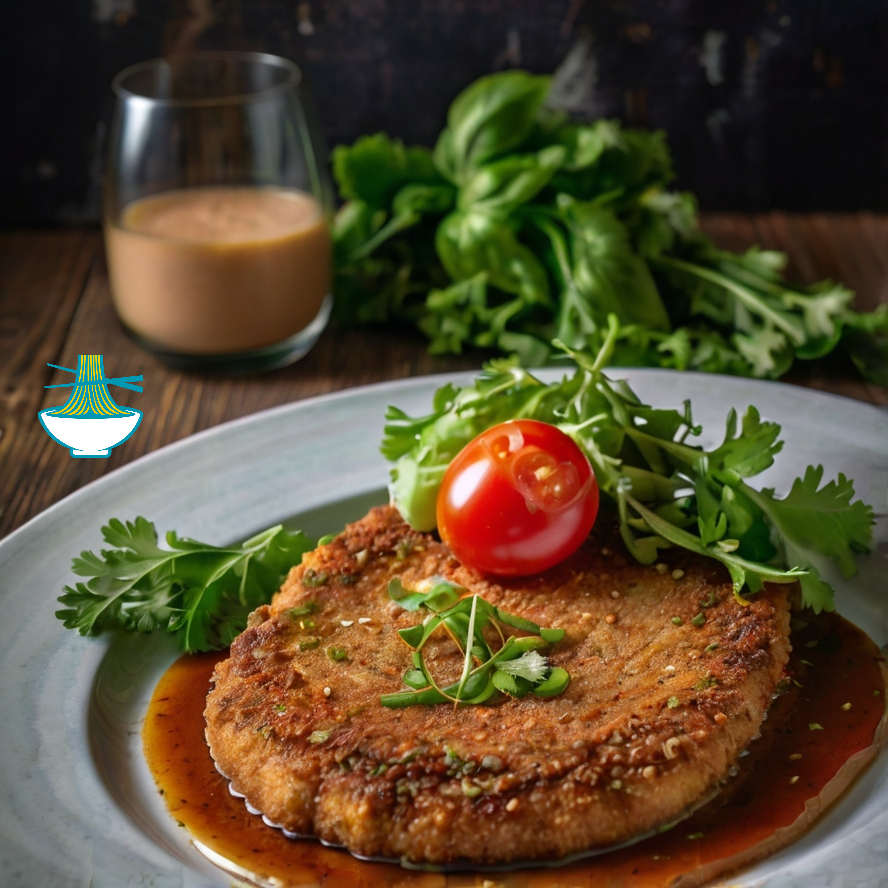Indulge in the savory delight of Soy Milanesa, a meat-free alternative to the traditional Argentine dish. Made with flavorful soy protein, this recipe offers a satisfying texture and taste reminiscent of the original. Perfect for vegetarians and meat-lovers alike, discover how to create this culinary masterpiece at home with our step-by-step guide.
Ingredients:
- 1 cup textured soy protein (soy curls or soy chunks)
- 1 cup breadcrumbs
- 1/2 cup all-purpose flour
- 2 eggs, beaten (or substitute with plant-based alternative for vegan version)
- 1/4 cup milk (or plant-based milk)
- Salt and pepper to taste
- 1 teaspoon paprika
- 1 teaspoon garlic powder
- Vegetable oil for frying
- Lemon wedges for serving
Instructions:
1-Rehydrate the textured soy protein according to the package instructions. Drain well and squeeze out any excess water.
2-In a shallow dish, mix together the breadcrumbs, salt, pepper, paprika, and garlic powder.
3-In another shallow dish, whisk together the eggs and milk.
4-Set up a breading station with the rehydrated soy protein, flour, egg mixture, and breadcrumb mixture.
5-Take a piece of rehydrated soy protein and coat it in the flour, shaking off any excess.
6-Dip the soy protein into the egg mixture, ensuring it's fully coated.
7-Press the soy protein into the breadcrumb mixture, making sure it's evenly coated on all sides. Repeat with the remaining soy protein pieces.
8-Heat vegetable oil in a large skillet over medium-high heat.
9-Once the oil is hot, carefully place the breaded soy protein pieces into the skillet. Cook for 3-4 minutes on each side, or until golden brown and crispy.
10-Remove the Milanesa de Soja from the skillet and place them on a plate lined with paper towels to drain any excess oil.
11-Serve the Milanesa de Soja hot with lemon wedges on the side for squeezing.
Enjoy your delicious vegetarian version of Milanesa made with soy!
Nutritional Values :
Textured soy protein (soy curls or soy chunks):
- Calories: 320
- Protein: 52g
- Carbohydrates: 24g
- Fat: 4g
- Fiber: 20g
benefits:
- Rich source of plant-based protein, essential for muscle repair and growth.
- Low in saturated fat and cholesterol, making it heart-healthy.
- Contains fiber, aiding in digestion and promoting gut health.
- Provides essential nutrients like iron, calcium, and potassium.
Breadcrumbs (1 cup):
- Calories: 400
- Protein: 12g
- Carbohydrates: 84g
- Fat: 4g
- Fiber: 6g
benefits:
- Adds texture and crunch to dishes like Milanesa.
- Can be made from whole grain bread, providing fiber and essential nutrients.
- Helps bind the breading to the soy protein.
- Can be seasoned with herbs and spices for added flavor without extra calories.
All-purpose flour (1/2 cup):
- Calories: 228
- Protein: 6g
- Carbohydrates: 48g
- Fat: 1g
- Fiber: 2g
benefits:
- Used as a coating for the soy protein, creating a crispy outer layer.
- Contains carbohydrates, providing energy for daily activities.
- Contains small amounts of protein and fiber.
- Fortified with vitamins and minerals like iron and B vitamins.
Eggs (2 large):
- Calories: 140
- Protein: 12g
- Carbohydrates: 1g
- Fat: 10g
- Fiber: 0g
benefits:
- Protein: Eggs are an excellent source of high-quality protein, containing all the essential amino acids. Two large eggs provide about 12 grams of protein, which supports muscle growth, repair, and overall body function.
- Vitamins and Minerals: Eggs are rich in essential nutrients, including vitamin B12, riboflavin, selenium, and phosphorus. They also contain choline, which is important for brain health and metabolism.
- Healthy Fats: Eggs contain healthy fats, including omega-3 fatty acids (especially in eggs from pasture-raised chickens), which support heart health and reduce inflammation.
- Antioxidants: Lutein and zeaxanthin, found in the yolk, are antioxidants that help protect the eyes from harmful blue light and reduce the risk of cataracts and macular degeneration.
Milk (1/4 cup, whole milk used for calculation):
- Calories: 37
- Protein: 2g
- Carbohydrates: 3g
- Fat: 2g
- Fiber: 0g
benefits:
- Calcium: Whole milk is a rich source of calcium, providing about 68 mg per 1/4 cup, which is essential for strong bones and teeth. Calcium also plays a role in muscle function and nerve transmission.
- Vitamin D: Whole milk is often fortified with vitamin D, which helps in the absorption of calcium and supports bone health. Vitamin D also plays a role in immune system function.
- Healthy Fats: Whole milk contains beneficial saturated fats, which are important for hormone production, brain function, and the absorption of fat-soluble vitamins (A, D, E, and K).
- Protein: A 1/4 cup of whole milk provides around 2 grams of protein, contributing to muscle repair and growth.
- Energy: The fats in whole milk provide a concentrated source of energy, which can be particularly beneficial for those needing more calories in their diet.
Vegetable oil for frying (amount depends on usage):
Calories: Varies based on the amount used (approximately 120 calories per tablespoon)
benefits:
- Source of Energy: Vegetable oil is calorie-dense, providing a significant amount of energy. This can be beneficial in maintaining energy levels, especially for those with high caloric needs.
- Vitamin E: Many vegetable oils, such as sunflower or safflower oil, are high in vitamin E, an antioxidant that helps protect cells from damage and supports immune function.
- Healthy Fats: Depending on the type of vegetable oil used, it may contain unsaturated fats (like monounsaturated and polyunsaturated fats), which can help reduce bad cholesterol levels and lower the risk of heart disease.
- Cooking Benefits: Vegetable oil has a high smoke point, making it suitable for frying and cooking at high temperatures without breaking down and releasing harmful compounds.
Please note that these values are approximate and may vary based on brands and specific ingredients used. Additionally, the nutritional values for the final dish will depend on factors such as the amount of oil absorbed during frying and any additional seasonings or toppings added.


Comments